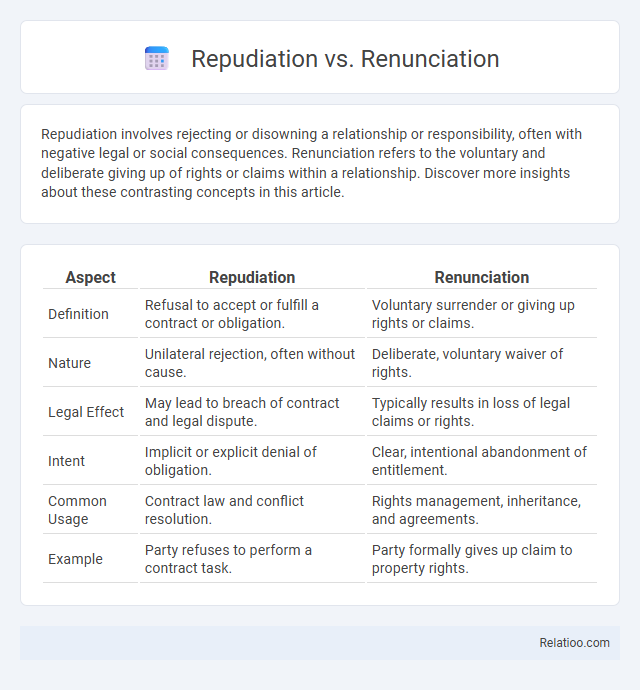Repudiation involves rejecting or disowning a relationship or responsibility, often with negative legal or social consequences. Renunciation refers to the voluntary and deliberate giving up of rights or claims within a relationship. Discover more insights about these contrasting concepts in this article.
Table of Comparison
| Aspect | Repudiation | Renunciation |
|---|---|---|
| Definition | Refusal to accept or fulfill a contract or obligation. | Voluntary surrender or giving up rights or claims. |
| Nature | Unilateral rejection, often without cause. | Deliberate, voluntary waiver of rights. |
| Legal Effect | May lead to breach of contract and legal dispute. | Typically results in loss of legal claims or rights. |
| Intent | Implicit or explicit denial of obligation. | Clear, intentional abandonment of entitlement. |
| Common Usage | Contract law and conflict resolution. | Rights management, inheritance, and agreements. |
| Example | Party refuses to perform a contract task. | Party formally gives up claim to property rights. |
Introduction to Repudiation and Renunciation
Repudiation refers to the outright rejection or refusal to accept a contract or obligation, often signaling an intention not to be bound by the agreement. Renunciation involves voluntarily giving up a right or claim, typically before any breach occurs, showing a clear abandonment of a legal entitlement. Understanding the distinction between repudiation and renunciation is crucial for protecting your legal interests in contractual relationships.
Defining Repudiation
Repudiation refers to the refusal to accept or fulfill a contractual obligation, effectively rejecting the terms or performance required. It serves as a fundamental breach where one party declares an intention not to be bound by the contract, allowing the other party to seek remedies or treat the contract as terminated. Understanding repudiation helps you protect your rights in contractual disputes by clearly distinguishing it from renunciation, which involves voluntary rejection of a right, and general non-performance.
Understanding Renunciation
Renunciation involves a voluntary and deliberate decision to give up a right, claim, or privilege, distinguishing it from repudiation, which typically refers to rejecting or disowning an obligation or contract. Understanding renunciation requires recognizing it as a formal declaration where You intentionally abandon your legal rights, often documented to prevent future claims. This act is crucial in legal contexts, such as wills or contracts, where clarity about rights being surrendered is necessary to avoid disputes.
Key Differences Between Repudiation and Renunciation
Repudiation refers to the rejection or denial of a contract or agreement by one party, often leading to legal consequences due to breach of contract. Renunciation involves voluntarily giving up a legal right, claim, or privilege, typically without contesting or breaching a contract. Key differences include repudiation being an act of refusal or denial affecting contractual obligations, whereas renunciation is a deliberate abandonment of rights without disputing the underlying contract terms.
Legal Implications of Repudiation
Repudiation in legal terms refers to one party's refusal or inability to fulfill contractual obligations, which allows the non-breaching party to terminate the contract and seek damages. Renunciation involves a party explicitly abandoning a right or claim, often prior to a breach, potentially altering the parties' legal remedies. The legal implications of repudiation include the right to accept the repudiation as a breach, treat the contract as discharged, and pursue remedies such as compensatory damages or specific performance depending on jurisdiction and contract terms.
Legal Consequences of Renunciation
Renunciation involves voluntarily giving up a legal right or claim, which can lead to the loss of certain protections or entitlements and prevent You from asserting those rights in court. Unlike repudiation, which is the rejection of a contract or obligation often leading to breach remedies, renunciation typically results in the affected party being barred from enforcing the renounced right. Legal consequences of renunciation include the forfeiture of benefits and the inability to demand performance or compensation related to the renounced claim.
Repudiation in Contract Law
Repudiation in contract law refers to a party's clear indication that they will not perform their contractual obligations, allowing the other party to accept the breach and terminate the contract. Renunciation involves voluntarily giving up a right or claim, while repudiation specifically relates to a breach of contract signaling non-performance. Understanding repudiation helps you protect your legal rights by enabling prompt action to mitigate damages and enforce remedies.
Renunciation in International Law
Renunciation in international law refers to the formal rejection or abandonment by a state or individual of a right or claim, often documented through explicit declarations or treaties, significantly impacting sovereignty and treaty relations. Unlike repudiation, which entails a refusal to recognize or comply with an obligation often viewed as a breach of international law, renunciation implies a voluntary and consensual relinquishment of rights, typically leading to lawful and recognized changes in legal status. Understanding the distinctions between renunciation, repudiation, and waiver is critical for interpreting state actions, treaty obligations, and the enforcement of international legal norms.
Common Misconceptions About Repudiation and Renunciation
Repudiation often gets confused with renunciation due to both involving rejection, but repudiation refers specifically to refusing to honor a legal obligation or contract, whereas renunciation entails voluntarily giving up a right or claim. A common misconception is that repudiation automatically voids an agreement, but it typically leads to legal consequences or damages rather than immediate nullification. Your clear understanding of these distinctions can prevent misinterpretation of legal actions and obligations in contracts or claims.
Conclusion: Choosing Between Repudiation and Renunciation
Choosing between repudiation and renunciation depends on the context and legal consequences your situation demands. Repudiation involves rejecting a contract or obligation, often leading to legal disputes, while renunciation typically means voluntarily giving up a right or claim without contest. Your decision should align with the desired outcome, whether it's ending a binding agreement or relinquishing specific rights.

Infographic: Repudiation vs Renunciation
 relatioo.com
relatioo.com